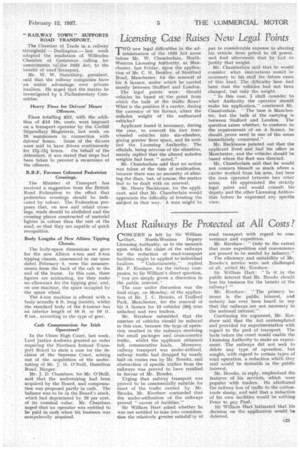Must Railways Be Protected at All Costs?
Page 71

If you've noticed an error in this article please click here to report it so we can fix it.
CONCERN is felt by Sir William Hart, North-Western Deputy Licensing Authority, as to the measure upon which the claim of the railways for the reduction of road-transport facilities might be applied to individual hauliers. " Unfortunately," replied Mr. P. Kershaw, for the railway companies, to Sir William's direct question, "you are simply given a discretion in the public interest."
The case under discussion was the final stage, on Monday, of the application of Mr. J. C. Brooks, of Trafford Park, Manchester, for the renewal of his A licence for 13 vehicles (56f tons unladen) and two trailers.
Mr. Kershaw submitted that the number of vehicles should be reduced in this case, because the type of operation resulted in the railways receiving the small packages and cross-country traffic, whilst the applicant obtained
full, remunerative loads. Moreover, railway transport was under-utilized, railway traffic had dropped by nearly half on routes run by Mr. Brooks, and abstraction of specific traffics from the railways was proved to have resulted in favour of Mr. Brooks.
Urging that railway transport was proved to be commercially suitable for most of the traffic carried by Mr. Brooks, Mr. Kershaw contended that the under-utilization of the railways proved " excess of facilities."
Sir William Hart asked whether he was not entitled to take into consideration the relatively greater suitabil' Ly of road transport with regard to convenience and expedition.
Mr. Kershaw: "Only to the extent that more expedition and convenience are proved to be needed by industry."
The efficiency and suitability of Mr. Brooks's service were not challenged at all, added Mr. Kershaw, Sir William Hart: " Is it in the public interest that Mr. Brooks should lose his business for the benefit of the railway? "
Mr. Kershaw : "The primary interest is the public interest, and nobody has ever been heard to say that the railways are not necessary in the national interest."
Continuing the argument, Mr. Kershaw said that the Act contemplated and provided for experimentation with regard to the pool of transport. The facts before the court would enable the Licensing Authority to make an experiment. The railways did not seek to delete any type of operation, but sought, with regard to certain types of road operation, a reduction which they said would be desirable in the public interest.
Mr. Brooks, in reply, emphasized the features of his services, which were popular with traders. He attributed the railway loss of traffic to the cottontrade slump, and said that a reduction of his own facilities would be robbing Peter to pay Paul. Sir William Hart intimated that his decision on the application would be deferred.




























































































































































